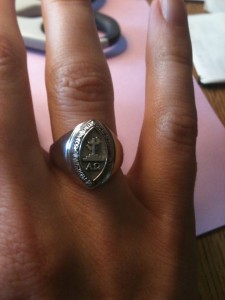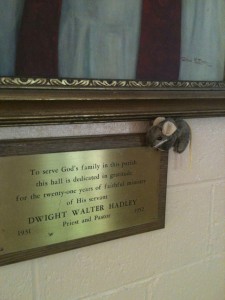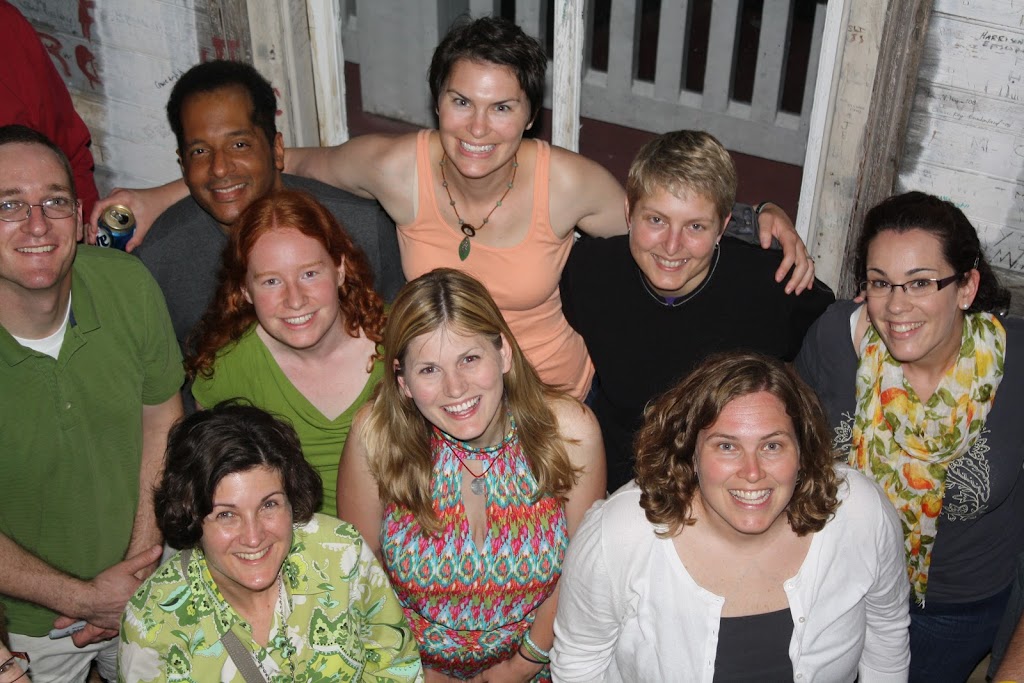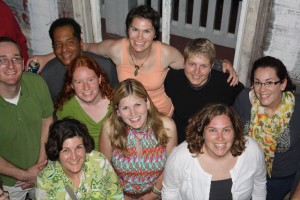Today was my last at field education. The last two years at St. Anne’s were wonderful and formational. This is the sermon I preached… based on the readings for Easter 5 year B. Enjoy!
Good-byes are rarely easy, even when they may have been anticipated. When I was working in the hospital I said goodbye frequently. Usually those good-byes were happy occasions. Often, saying goodbye to a patient meant that he or she was well enough to go home. Sure, I would miss them; But our goal was healing that resulted in homecoming. Because of the conditions I specialized in, I had many long-term patients. They were always the ones who were hardest to say good-bye to.
There is one girl in particular who immediately comes to mind when I think of good-byes. Nancy was a 4-year-old child of immigrants. Her parents did not speak English, but Nancy was bilingual. Because of their work at a factory several hours from the hospital, Nancy’s parents were not able to visit very frequently. She would spend days or even weeks waiting for a visit from her parents. They were good people, but the language barrier coupled with a less than cooperative employer made visiting difficult. Nancy became one of my special patients.
During her 4-month stay at the hospital I had a standing date with Nancy everyday, Monday through Friday, at 3:25 in the afternoon. Nancy’s favorite television program was on everyday at 3:00. I couldn’t always watch the show with her, but I made the commitment to be in her room everyday in time for the closing theme song. Sometimes I had to run through the hallways in order to make it on time. Some days I would be late, and on rare occasions I missed our date. But I never forgot that I was supposed to be there.
One Thursday afternoon I showed up at her room to sing the song and found her room cleaned, reset, and ready for a new patient. I was perplexed; Nancy had been there in the morning when I’d run past on my way to another room. I knew I would see her at 3:25 so I didn’t worry about it. But when 3:25 rolled around, Nancy was gone. (Don’t worry: Nancy was okay!)
We are almost at the end of the Easter season, two weeks from now we will be in the last week of Easter and we will celebrate Jesus’ Ascension into Heaven. The passage from John’s Gospel that we read this morning is from what is called Jesus’ “final discourse.” This is where Jesus is preparing to say goodbye to the disciples by imparting his last lessons about the love of God and the commandments to keep. In doing this Jesus is also enabling them to say goodbye to him.
But Jesus does something a little bit tricky, Jesus tells the disciples to abide in him as he abides in them. Hold up, do you see what he did there? He indirectly told the disciples that he is still going to be around, in a way. Through the commandments he leaves, the lessons he has taught them, and the love that is always available from God, He is here. He said all of that when he said the word, “Abide.”
 Abide isn’t a word you hear very often, unless of course, you are a seminarian thEVirginia Theological Seminary. I must now give pause to thank one of my brilliant and faithful classmates who gave a sermon in the seminary chapel that focused on the word abide. Since that sermon a few months ago, the word pops out at me when I am reading scripture and causes me to pause. I hadn’t realized the power contained in that word before her sermon, and I know I will never forget its power now.
Abide isn’t a word you hear very often, unless of course, you are a seminarian thEVirginia Theological Seminary. I must now give pause to thank one of my brilliant and faithful classmates who gave a sermon in the seminary chapel that focused on the word abide. Since that sermon a few months ago, the word pops out at me when I am reading scripture and causes me to pause. I hadn’t realized the power contained in that word before her sermon, and I know I will never forget its power now. You see, I used to think that Abide meant, “to rest in.” –I was wrong. (That does happen from time to time…) What abide actually means is: to uphold, adhere to, or stand by – but it can also mean to remain, persist, or live on. Some might say that my definition, “to rest in” was close enough, but I disagree: Abide is an action verb and I was making it passive. Yes, it is true that “technically” to rest is an action very… but, let’s face it, the “resting in” I was talking about had nooooo action involved in it. The “resting” I was talking about meant that I would sit back and let God come to me.
One of the ways I talk about refreshing myself is in allowing myself to be washed in the word, which sounds like a passive act, until we look at it in the context of our Baptism. All of a sudden, when we look at being “washed in” the word in the context of Baptism it becomes an action. Baptism is a choice we make, or a choice made on our behalf until we are old enough. It is a choice to adhere to God’s law and accept God’s love. Baptism is a choice to Abide in God. Abiding isn’t just lying there letting things happen to you; Abiding is acting, even when it is still, abiding is an action based decision. By telling the disciples to Abide in him, Jesus is communicating that they do not have to do their future ministry alone: he will be a persistent presence in their lives as long as they actively choose to adhere to God’s commandments and remain faithful in their love of God in Christ.
This idea of Abiding has been close to my heart as I prepare to say goodbye in so many parts of my life and to so many people who have been walking with me. St. Anne’s is a big part of that I intend to Abide here with you all, even though this is my last Sunday at St. Anne’s. So, this seems as appropriate a time as any to tell you about a a spiritual practice of sorts that I engage in each week as I sit up front with the altar party. It started my first Sunday at St. Anne’s and continues every sunny Sunday morning and I’d like to share it with you today.
The key word in my Sunny Sunday Spiritual Practice, is sunny… this practice doesn’t work when it is cloudy out. What I like to do is to watch the shapes that the sun casts around the room through the windows. I like to watch them as they gradually re-member themselves by the end of the 11:15 service. I will explain: You see those diamond shaped windows up to the sides and then up at the back? During the fall and winter months the sun shines through those windows and at the start of the 7:45 service the shapes they cast are slivers of triangles that begin on the ceiling, as we progress through the 9:00 service the triangles move and bend and distort as they travel from the ceiling into the pews effectively blinding a number of you as the services continue. But while you are reaching for your sunglasses or otherwise shielding your eyes, I am noticing that the effect of the triangles of light is like a halo. Even if just for a moment, you look like angels in that light. The light moves and hits different people from minute to minute. On Sunny Sunday mornings I look into the congregation and I see a room full of illuminated angels.
I like to think that the sunlight is actually the Holy Spirit exposing the Christ within each of us as it hits. By the end of the 11:15 service the triangles of light move back to the ceiling, eventually rejoining together to form the perfect diamond that mirrors the shape of the window. When that happens I think of it as the Christ that is within us all bonding together in the corporate body of Christ. Later in the spring and early summer months (like now) the light comes from the latticework above the altar, but it gives the same effect = Angels in our midst.
The Epistle reading this morning from 1 John reminds us to Abide in love, because it is in abiding in love that we abide in God. I love you. I love the people of St. Anne’s. There have been times when it has been a struggle to get up early and drive out here early on a Sunday morning, but I always leave grateful that I was here. You have been kind, generous, challenging, comedic, encouraging, and thoughtful. You have pushed me to be better. And you have supported me when I was struggling. A major constant in my life in the past two years has been my time with all of you; I thank you for that. I intend to abide in you. I will abide in your call to social justice. I will abide in your inclusive nature. I will abide in your desire for intelligent conversation. I will abide in your love of Jesus Christ. I will abide in you.
You have taught me that I can be creative in Adult Formation curriculum and in liturgical planning. You’ve taught me to be curious in conversations as I meet new people at coffee hour. You have taught me to be faithful but relaxed in my sermon preparation and to be open to critique. My lay committee, Audree, Emily, David, Rachel, and Jim have taught me to assert my boundaries, be confident in my abilities, and claim my authority. I will carry all of this with me as I abide in you. Because we are collectively called to abide in God’s love, and abiding in that love together is a universal bond that eternally unites us to one another.
Good-byes are rarely easy, even when they may have been anticipated.
That Thursday afternoon when I arrived on the unit to see Nancy I was devastated that I didn’t get to say goodbye. I knew we had been working for weeks on transferring Nancy to a hospital closer to her parents but there had been no indication that this was going to happen soon. I had taken for granted that Nancy was going to be there when I ran past that morning. I knew I would get another chance to say goodbye so I hadn’t stopped. But upon further reflection I realized something: with every loving interaction I’d had with Nancy we had been saying goodbye, because we were creating memories in which we could Abide. The truth is, Nancy and I said goodbye to one another everyday at 3:25 when we sang her theme song together:
Goodbye, for now, until we meet again.
I say so long, farewell, to you my friends
Goodbye, for now, until we meet again.
Amen.


















Recent Comments